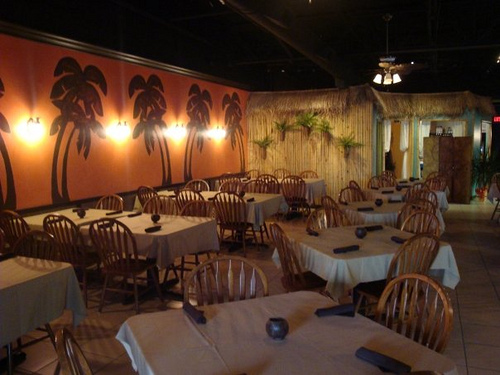Start a Killer Restaurant: 6 Tips
Advice from a white guy in Texas who became an award-winning sushi chef and restaurant owner.
By Jeff Haden
CALM BEFORE THE STORM: Uchiko is one of two wildly popular sushi restaurants (the other is called Uchi) in Austin, Texas started by Chef Tyson Cole. Rumor is, the wait is always an hour to get into either one.
Nearly half of all adults have worked in the restaurant industry at some point, and 46 percent of restaurant employees say they would like to own a restaurant someday.
Clearly many people dream of owning a restaurant.
No one dreams of owning a failed restaurant, though.
That’s why I asked Tyson Cole, one of the Food & Wine magazine’s 2005 Best New Chefs, 2011 James Beard Foundation Best Chef Southwest, and co-owner of the Japanese restaurants Uchi and Uchiko in Austin, Texas, for tips for would-be restaurateurs.
Just keep in mind Cole’s background is varied, extensive–and unusual.
He quit one job after he was told he couldn’t make sushi because he was white; he was rehired two days later but told he had to work in the back where guests couldn’t see him. He was also fired for giving a guest a free dessert; he was rehired when the manager found out the guest was Denzel Washington.
Here’s what he says, in his own words, about how to start a successful restaurant:
1. Never start without the big three. No restaurant succeeds without a great chef, a great location, and a great concept. They all work together. Your location should fit your concept. Your chef, or “talent,” must fit your concept, otherwise you’ll constantly deal with the most common word in the restaurant business: Drama.
Some entrepreneurs say, “Well, location doesn’t matter because I’m going to create a destination restaurant.” In my experience, people say that when they have a bad location. It’s hard to become a destination if you don’t start with a great location.
Accessibility is everything. The more accessible you can make your restaurant, both in terms of location and in a broader sense, the greater your chances of success. Look at the most successful restaurants: They’re the most accessible in terms of location, brand, and price point. Fast casual restaurants are booming because they’re incredibly accessible on all levels.
2. Always overestimate your capital needs. Plan on having six to nine months of working capital from the start. You’ll be surprised by how quickly the expenditures add up and how much time it takes for a new place to grab hold and get legs/regular customers.
Many new restaurants see a major downswing in business after the opening’s initial excitement. That’s when capital is critical. When I started Uchi I brought clientele with me, but even so there was a gap after the first few months. We had to wait to see if the restaurant would really catch on.
A lot of restaurant owners start out with cash in reserve and start blowing it because they think the honeymoon phase will last forever. That’s why most restaurants go out of business. Never let initial success go to your head. Success is only determined years later.
3. Learn to love teaching. I often bring in people from different places, including interns from culinary schools. Paul Qui, a chef currently competing on Top Chef: Texas, is a great example. Paul came in eight years ago and asked to work for free. He’s worked through every station and now is the Executive Chef at Uchiko.
I don’t work in the kitchen much anymore but I do get to help teach people like Paul. That’s incredibly rewarding.
Doing something new is inspiring. Helping to shape the menu is inspiring. Everyone loves new dishes–the front of the house, the wait staff… once people love to come to work, you’re money.
4. Never be cheap where guests are concerned. The most important money you will spend is money that adds value to the guest.
I definitely made mistakes early on, especially when I tried to go cheap on certain things like equipment, valets, and even desserts. That was short sighted, because everything that touches a guest is important.
Determine a percentage of your revenue to put into improvements that affect the guest and constantly enhance their experience. At Uchi we don’t spend money on advertising or marketing but we run a very high level of comps. We give away gift cards and send a lot of complimentary dishes to tables.
Guests love when a dish comes out and the server says, “The chef wanted you to try this,” because that creates a real connection and makes the experience personal.
Make sure you spend as much money as possible on the guest experience. Spend money on the people already in your restaurant, because that’s the best way to generate genuinely positive word of mouth.
5. Focus on organization and systems of operation. Failing to put systems in place is one of the biggest mistakes an independent restaurant owner makes. I have an amazing partner, Daryl Kunik, and that was more of his realm.
Many restaurant owners don’t want to come off as corporate; to them, the “C” in the word “corporate” is like the Scarlet Letter. To embrace systems would be like selling out and becoming a chain.
I feel the opposite. There’s a reason chain restaurants thrive: Every one of them started as an individual restaurant. Each had a great chef, a great concept, and a great location, and they developed systems that enabled them to build guest demand, hold on to key people, and make money. Otherwise it would have been impossible to open two locations, much less 200.
Organization doesn’t kill the flow of creativity. Putting outstanding systems in place gives you the freedom to be creative.
6. Be ready to evolve, especially if you’re a chef. Many businesses are started by a craftsperson with an idea for a product. Rarely does that idea become anything unless that person partners with someone with a complementary ability, like, “You carve wooden bananas and I can sell them for you.” That’s when an idea becomes a business. I have great ideas, but without someone like Daryl, Uchi would have never succeeded.
Now as a restaurateur my focus is almost solely on people and communication. It was hard for me to say, okay, while I’ll always be a chef, I’m not going to be in my kitchen all the time. I’m going to teach and delegate instead. Once I embraced that I was able to do so much more. That was my tipping point.
Always look for people who are smarter than you. As a business owner the smartest thing you can do is partner with people who know things you don’t—and then give them a reason to care.
Source: inc.com
Further Research: https://www.thebalance.com/before-you-open-a-restaurant-2888639










